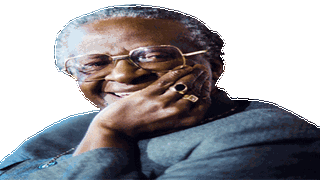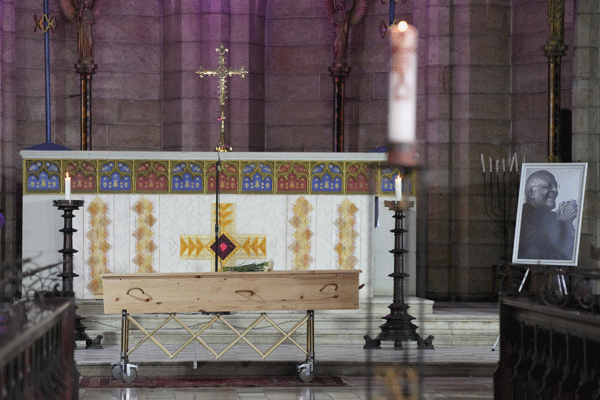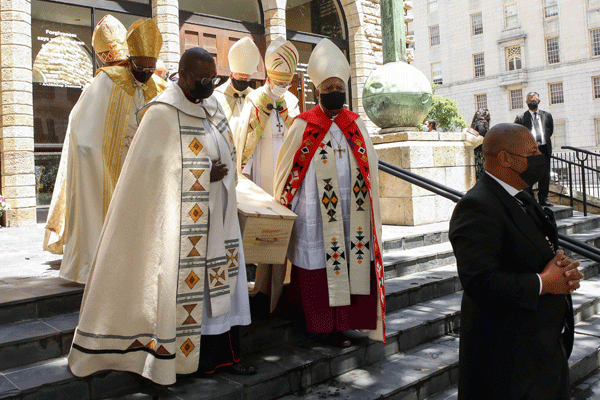
Archbishop Desmond Tutu. PHOTO/AFP
|News
Prime
Desmond Tutu: Conscience of S.Africa rests
What you need to know:
- South African anti-apartheid icon Desmond Tutu, 90, was laid to rest yesterday.
“How many more must die, that have not died; how many more must suffer, that have not suffered; what more and, what else must we say, that have not been said; what else must we do, that we have not done”, that was Archbishop Desmond Tutu, in a strong, energetic, activist-like voice of a fervent politician, yet, delivered with a majestic undertone of a cleric, a driven man of God.
That was at the ‘Mandela-at-70’ concert in Hyde Park, London in June 1988. Hundreds of thousands of people had converged in London from across the country and several hundreds of course, had flown in from various parts of the world.
That Mandela concert was among the largest crowds to gather on these matters yet, at the time and to me, it was the first such assembly ever, having been part of procession that went for hours round the city, starting from Finsbury Park. With the most famous global names in music playing live-joint bands, Winnie Mandela was the mid-star from South Africa.
That was to me, the upgraded initiation in the continued campaigns and struggle against apartheid which, as it happened, collapsed with the eventual release of Nelson Mandela just two years later (1990).
The release of Mandela, set off a series of events starting critically with the Convention for a Democratic South Africa (CODESA), led by judges Michael Corbett, Petrus Shabort and Ismail Mohamed, then the Multi-Party Negotiating Process (MPNP) culminating in the Constitutional Assembly tasked with and, parenting the constitutional making and resolution for a new South Africa.
The emergent processes with Mandela and colleagues from where emerged his famous ‘talks about talks’, saw the solidification of seedlings that would usher in Nelson Mandela as the first freely, democratically elected President of South Africa in April 1994.
Mixed in battles for supremacy, the predominantly Zulu (conservative, US backed) Inkata Freedom Party (IFP) of Chief Mangosuthu Buthelezi variously had running close-to-war situations with the now dominant, locally and globally famous ANC.
Yet while the white minority establishment led by FW de Clerk and his apartheid National Party had reluctantly and imperatively given in; the contest for power and privilege never diminished.
Thus, they cleverly sought to arm-twist the ANC and their allies during talks; seeking to secure and guarantee their futures in human, economic and to a reasonable extent, political terms. But the extreme right-wing of apartheid privilege could not have any of that; they still wanted it all.
One group, headed by the Eugene Terre Blanche, the notorious leader of the neo-Nazi group, Afrikaner Resistance Movement (AWB) previously set up to counter anti-apartheid advances in 1986 allegedly to play on the white fears of black (African) revolution paced up their alternative cause to seek a whites-only State they called “Volkstaat” exclusively for South Africa’s then about 3.5 million Afrikaners.
They were rebuffed, repelled and in a rare moment of anger, Nelson Mandela warned the extremists would “be taught lessons they would never forget”. And the battles continued. On April 10, 1993 the shock occurred: Chris Hani, the charismatic giant of ANC’s military struggles was assassinated.
Even for me, who had never met him, I broke down following the news. I recall ringing a friend in London from my little flat in Kent saying ‘they have killed him’; whom, he asked. Chris Hani I said, almost as if I knew or, had reason to know who would – at the time – have killed him. But blink, the conclusions then were perhaps easier than the mixes of today. What if Chris Hani had lived for another decade?
Yet amid all this was Desmond Tutu, considered the ‘moral compass’ in the struggle and now the tricky mix of the negotiations and transition that would lead to the new South Africa.
It is reported that it is he who emerged with the concept of the ‘Rainbow Nation’, a thematic content and context brand that was to drive the moderation of the minds of black and white South Africans, the international community’s perception of the country and, certainly calming down the doubts of those who had grounds not to trust the willingness (if any), of white power and privilege, especially around economic domination, to concede, if at all to compromise long term for the emancipation of all South Africans.
Going into the process of Truth and Reconciliation Commission (TRC) that he chaired, he was seen to be open, fair and objective.
But it was then too, that I had some mild reservations; how could he seem to want to crucify Winnie Mandela (understandably), over the kidnap and murder of teenager Stompie Moeketsi by her bodyguards, known as the Mandela United Football Club while seemingly and, (strongly perceived) he was apparently less rigorous on apartheid leaders including FW de Clerk, Pik Botha, PW Botha and others who led regimes that were directly involved in killings, kidnaps and assassination of thousands of mainly black South Africans and other Africans associated with the anti-apartheid campaigns both inside and outside South Africa?
But whatever your opinion, it was a difficult balance and considering that he sought to play the middleman, it is perhaps understandable.
Following his death, specific tributes of note variously came. Bernice King, the youngest daughter of civil rights icon Martin Luther King Jr wrote: “We are better because you were here”. Then I immediately remembered one of his quotes, “enemies are only friends waiting to be made”, a difficult one for me under these circumstances but, it generally makes sense.
Then another, “forgiving is not forgetting; it’s actually remembering: remembering and not using your right to hit back. It’s a second chance for a new beginning. And the remembering part is particularly important.”
And only when you get this off him do you notice the balance: “Be nice to whites, they need you to rediscover their humanity”. From personal experience as a mini-global tourist, it makes absolute sense.
As time passed, the realities hit all sections of South Africa. He increasingly became critical of the ruling African National Congress and to the shock of many in 2014, he said that he prayed ANC would lose power. “With a heavy heart, I will not vote ANC”.
He was particularly critical of the Jacob Zuma administration saying, “we have to admit that not too many of those leaders have been able to fill in the shoes of the Mandela generation” yet he was quick to remind the world that on democracy in South Africa, it has been “a heck of an achievement”.
As he was laid to rest yesterday (1st January 2022), it is clear that his idea of “a rainbow nation” – for some of the reasons previously given and with the competing interests – never really coalesced in the way they had dreamt.
While seemingly the majority of Africans forgave and possibly even forgot, a critical number of whites (interests) never gave in part or any of their coercive privileges except political governance and that, simply because of the imperatives of the tyranny of numbers when freely applied in a democracy.
Desmond Tutu ran his race like a few others; “if you are neutral in situations of injustice, you have chosen the side of the oppressor”.
On this I liked him the most. And on this, I say, African clerics, hearts and spirits of conscience, where are you? Herein, lies the most important lesson for African youth, Africans in-the-know, with capacity and yet on the fence. You must decide. “Brave voice of the voiceless”, said President Cyril Ramaphosa. Sadly now, an endangered species. RIP Arch.
About Desmond Tutu
A tireless activist, Tutu won the Nobel Peace Prize in 1984 for combatting white minority rule in his country.
Famously outspoken even after the fall of the racist apartheid regime in the 1990s, Tutu never shied away from confronting South Africa’s shortcomings or injustices.
It was Tutu who coined the term ‘‘Rainbow Nation’’ to describe South Africa when Nelson Mandela became the country’s first black president in 1994.
And he retired in 1996 to lead a harrowing journey into South Africa’s brutal past as head of the Truth and
Reconciliation Commission, which lifted the lid on the horrors of apartheid.
However, Tutu also criticised the ruling African National Congress (ANC) -- the vanguard of the fight against white-minority rule.
He challenged Mandela over generous salaries for cabinet ministers and stridently criticised the corruption that mushroomed under ex-president Jacob Zuma.
The writer is a Pan-Africanist, former columnist with New African Magazine and a leading voice in UPC.




